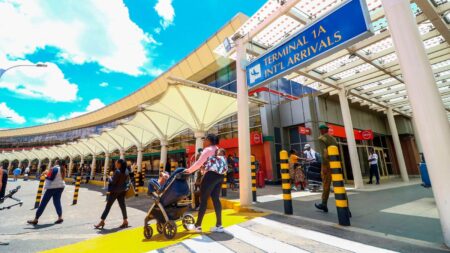- In Kenya, mobile phone users are opting for internet calls and texting as a measure to cut on costs.
- Last year, customers spent more time on a single on-net call averaging 2.8 minutes.
- Safaricom customers spent more on off-net calls, averaging at 1.4 minutes while Airtel accounted for 33.3% of voice and 10.3% of SMS traffic in Kenya.
An increasing number of mobile phone users in Kenya prefer using internet calls and texting as a measure to cut communication costs, a 2023 report by the Communications Authority shows. This shift is steadily eroding both voice and text revenues for mobile network providers in Kenya.
The report shows that the minutes of use per month per subscription decreased to 120.4 minutes in the three months to December 2023 compared to a higher 123.4 minutes during the previous quarter.
Similarly, short messages sent per month per subscription declined marginally to 65.4 from 65.8 messages. The report also attributes this to normalizing usage patterns following the busy festive seasons in quarters two and three.
The average minutes per on-net and off-net calls remained at 1.8 and 1.2, respectively. The analysis shows that Nairobi Securities Exchange-listed Safaricom PLC continued to dominate both the voice and SMS markets, accounting for 66.1 and 89.6 per cent of voice and SMS respectively. Rival Airtel accounted for 33.3 per cent of voice and 10.3 per cent of SMS traffic in the country during the review period.
According to the report, Airtel Networks Ltd customers spent more time on a single on-net call averaging 2.8 minutes whereas Safaricom customers spent more on off-net calls, averaging at 1.4 minutes.
Rise in Internet calls and texting
Last year, mobile services generated Sh384.3 billion in revenue, marking a 13.2 per cent increase from 2022. The analysis shows that a higher number of mobile phone users in the country prefer internet calls and texting to cut communication costs, coming at a time when incomes have been thinning amid rising cost of living.
This greatly impacted voice and text revenues for mobile network providers in the country, with the minutes of use per month per subscription dropping to 120.4 minutes in Q4, 2023 compared to123.4 minutes the previous quarter.
Read also: Digital Fraud Attempts: Kenyan Consumers Successfully Avoid 72 per cent of Digital Fraud
Average minutes per call
Similarly, short messages sent per month per subscription declined to 65.4 from 65.8 messages. The report also attributes this to normalizing usage patterns following the busy festive seasons in quarters two and three.
The average minutes per on-net and off-net calls remained at 1.8 and 1.2, respectively as telco giant Safaricom continued to dominate both the voice and SMS markets, accounting for 66.1 and 89.6 per cent of voice and SMS respectively.
Airtel accounted for 33.3 per cent of voice and 10.3 per cent of SMS traffic in the country during the review period. According to the report, Airtel Networks Limited customers spent more time on a single on-net call averaging 2.8 minutes whereas Safaricom consumers spent more on off-net call, averaging at 1.4 minutes.
“In 2023, mobile services generated Sh384.3 billion in revenue, marking a 13.2 percent increase from 2022. On the same trend, investment in the mobile sub-sector grew by 20.6 percent, to record Sh70.9 billion in 2023.” the CA report reads in part.
The total domestic fixed network traffic stood at 20.2 million minutes during the review period. Overall, the traffic for FY2023/24 declined by 11.3 per cent to 86.2 million minutes from 97.1 million reported in the previous year.
International incoming and outgoing fixed voice traffic declined by 4.8 and 4.5 per cent to record six million and 996,035 voice traffic, respectively during the referenced period.
Internet subscriptions experienced growth driven by increasing reliance on digital platforms for work, education, healthcare, and entertainment, along with attractive tariffs and special offers from service providers.
The total fixed Internet subscriptions grew by 7.4 per cent to reach 1.5 million. Satellite subscriptions recorded a significant growth of 73.1 percent in quarter four and a 1,955.3 percent growth in the financial year.
This growth is attributed to the licensing and subsequent launch of Elon Musk’s Starlink Internet Services Kenya earlier in the financial year. Internet customers were mainly subscribed to data speeds between 2Mbps and 10Mbps.
Satellite subscriptions maintained an upward trend following the launch of Starlink services during the year, with 96.9 per cent of satellite customers subscribed to speeds between 100Mbps and 1Gbps.
Safaricom reported the largest market share of 36.4 per cent followed by Jamii Telecommunications Ltd and Wananchi Group at 24.0 and 17.5 per cent respectively. Starlink Internet Services Kenya enjoyed a market share of 0.5 per cent as of June 30 2024.
On the same trend, investment in the mobile sub-sector grew by 20.6 per cent, to record Sh70.9 billion in 2023. The total domestic fixed network traffic stood at 20.2 million minutes during the review period. The traffic for FY 2023/24 declined by 11.3 per cent to post 86.2 million minutes from 97.1 million reported in the previous year.
International incoming and outgoing fixed voice traffic declined by 4.8 and 4.5 per cent to record six million and 996,035 voice traffic, respectively during the referenced period. Internet subscriptions experienced growth driven by increasing reliance on digital platforms for work, education, healthcare, and entertainment, along with attractive tariffs and special offers from service providers.
The total fixed Internet subscriptions grew by 7.4 percent to reach 1.5 million. Satellite subscriptions recorded a significant growth of 73.1 percent in quarter four and a 1,955.3 percent growth in the financial year.
Read also: Communications Authority of Kenya needs $820M for digital superhighway goals
Starlink Internet Services Kenya
This growth is attributed to the licensing and subsequent launch of Starlink Internet Services Kenya earlier in the financial year. Internet customers were mainly subscribed to data speeds between 2Mbps and 10Mbps.
Satellite subscriptions maintained an upward trend following the launch of Starlink services during the year, with 96.9 per cent of satellite customers subscribed to speeds between 100Mbps and 1Gbps.











